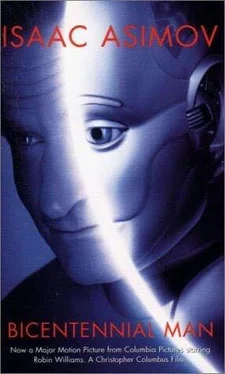Occasionally, someone came into the room to stare at him and he did not try to avoid the glance. He looked at each calmly, and each in turn looked away.
Paul Martin finally emerged. He looked surprised, or he would have if Andrew could have made out his expression with certainty. Paul had taken to wearing the heavy makeup that fashion was dictating for both sexes. Though it made sharper and firmer the somewhat bland lines of Paul’s face, Andrew disapproved. He found that disapproving of human beings, as long as he did not express it verbally, did not make him very uneasy. He could even write the disapproval. He was sure it had not always been so.
“Come in, Andrew. I’m sorry I made you wait, but there was something I had to finish. Come in, you had said you wanted to talk to me, but I didn’t know you meant here in town.”
“If you are busy, Paul, I am prepared to continue to wait.”
Paul glanced at the interplay of shifting shadows on the dial on the wall that served as timepieces and said, “I can make some time. Did you come alone?”
“I hired an automatobile.”
“Any trouble?” Paul asked, with more than a trace of anxiety.
“I wasn’t expecting any. My rights are protected.”
Paul looked all the more anxious for that. “Andrew, I’ve explained that the law is unenforceable, at least under most conditions. And if you insist on wearing clothes, you’ll run into trouble eventually; just like that first time.”
“And only time, Paul. I’m sorry you are displeased—”
“Well, look at it this way: you are virtually a living legend, Andrew, and you are too valuable in many different ways for you to have any right to take chances with yourself. By the way, how’s the book coming?”
“I am approaching the end, Paul. The publisher is quite pleased.”
“Good!”
“I don’t know that he’s necessarily pleased with the book as a book. I think he expects to sell many copies because it’s written by a robot and that’s what pleases him.
“Only human, I’m afraid.”
“I am not displeased. Let it sell for whatever reason, since it will mean money and I can use some.”
“Grandmother left you—”
“Little Miss was generous, and I’m sure I can count on the family to help me out further. But it is the royalties from the book on which I am counting to help me through the next step.”
“What next step is that?”
“I wish to see the head of U.S. Robots and Mechanical Men Corporation. I have tried to make an appointment; but so far I have not been able to reach him. The Corporation did not cooperate with me in the writing of the book, so I am not surprised, you understand.”
Paul was clearly amused. “Cooperation is the last thing you can expect. They didn’t cooperate with us in our great fight for robot rights. Quite the reverse, and you can see why. Give a robot rights and people may not want to buy them.”
“Nevertheless,” said Andrew, “if you call them, you may be able to obtain an interview for me.”
“I’m no more popular with them than you are, Andrew.”
“But perhaps you can hint that by seeing me they may head off a campaign by Feingold and Martin to strengthen the rights of robots further.”
“Wouldn’t that be a lie, Andrew?”
“Yes, Paul, and I can’t tell one. That is why you must call.”
“Ah, you can’t lie, but you can urge me to tell a lie, is that it? You’re getting more human all the time, Andrew.”
The meeting was not easy to arrange, even with Paul’s supposedly weighted name.
But it finally came about. When it did, Harley Smythe-Robertson, who, on his mother’s side, was descended from the original founder of the corporation and who had adopted the hyphenation to indicate it, looked remarkably unhappy. He was approaching retirement age and his entire tenure as president had been devoted to the matter of robot rights. His gray hair was plastered thinly over the top of his scalp; his face was not made up, and he eyed Andrew with brief hostility from time to time.
Andrew began the conversation. “Sir, nearly a century ago, I was told by a Merton Mansky of this corporation that the mathematics governing the plotting of the positronic pathways was far too complicated to permit of any but approximate solutions and that, therefore, my own capacities were not fully predictable.”
“That was a century ago.” Smythe-Robertson hesitated, then said icily, “Sir. It is true no longer. Our robots are made with precision now and are trained precisely to their jobs.”
“Yes,” said Paul, who had come along, as he said, to make sure that the corporation played fair, “with the result that my receptionist must be guided at every point once events depart from the conventional, however slightly.”
“You would be much more displeased if it were to improvise,” Smythe-Robertson said.
“Then you no longer manufacture robots like myself which are flexible and adaptable.”
“No longer.”
“The research I have done in connection with my book,” said Andrew, “indicates that I am the oldest robot presently in active operation.”
“The oldest presently,” said Smythe-Robertson, “and the oldest ever. The oldest that will ever be. No robot is useful after the twenty-fifth year. They are called in and replaced with newer models.”
“No robot as presently manufactured is useful after the twentieth year,” said Paul, with a note of sarcasm creeping into his voice. “Andrew is quite exceptional in this respect.”
Andrew, adhering to the path he had marked out for himself, continued, “As the oldest robot in the world and the most flexible, am I not unusual enough to merit special treatment from the company?”
“Not at all,” Smythe-Robertson said, freezing up. “Your unusualness is an embarrassment to the company. If you were on lease, instead of having been an outright sale through some mischance, you would long since have been replaced.”
“But that is exactly the point,” said Andrew. “I am a free robot and I own myself. Therefore I come to you and ask you to replace me. You cannot do this without the owner’s consent. Nowadays, that consent is extorted as a condition of the lease, but in my time this did not happen.”
Smythe-Robertson was looking both startled and puzzled, and for a moment there was silence. Andrew found himself staring at the hologram on the wall. It was a death mask of Susan Calvin, patron saint of all roboticists. She had been dead for nearly two centuries now, but as a result of writing his book Andrew knew her so well he could half persuade himself that he had met her in life.
Finally Smythe-Robertson asked, “How can I replace you for you? If I replace you, as robot, how can I donate the new robot to you as owner since in the very act of replacement you cease to exist.” He smiled grimly.
“Not at all difficult,” Paul interposed. “The seat of Andrew’s personality is his positronic brain and it is the one part that cannot be replaced without creating a new robot. The positronic brain, therefore, is Andrew the owner. Every other part of the robotic body can be replaced without affecting the robot’s personality, and those other parts are the brain’s possessions. Andrew, I should say, wants to supply his brain with a new robotic body.”
“That’s right,” said Andrew, calmly. He turned to Smythe-Robertson. “You have manufactured androids, haven’t you? Robots that have the outward appearance of humans, complete to the texture of the skin?”
“Yes, we have. They worked perfectly well, with their synthetic fibrous skins and tendons. There was virtually no metal anywhere except for the brain, yet they were nearly as tough as metal robots. They were tougher, weight for weight.”
Читать дальше












